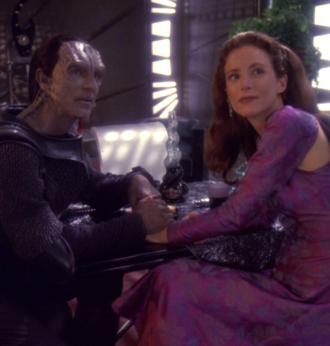 Though I’ve been a Trekkie since childhood, I had never seen all of Deep Space Nine until recently. The reason is simple: the series premiered in January 1993 and was midway through its third season when my first husband left me without warning. My life was thrown into turmoil and it took two years for me to get it straight again, during which time money was much too tight for the relative extravagance of cable TV. So though I saw all of the first two seasons, half of the third, and occasional episodes (at friends’ houses or via borrowed videocassettes) of the fourth and fifth seasons, I got rather lost due to the complex story arcs and decided not to see any more individual episodes until I could rewatch the whole show from the beginning. I gave Grace the complete series on DVD for Christmas about a decade ago, but still never got around to viewing it until this year, after I moved to Sunset as my primary residence. As I watched, I soon found that I agree with many reviewers’ opinion that the series is the best of all the Star Trek sequel series; though it was a direct spinoff of The Next Generation I find it very much superior to its parent, not only because of its greater consistency, better writing, and relief from the pressure of being THE Star Trek show of it decade, but also because it discarded the moral oversimplification which (unfortunately) permeates most of The Next Generation in favor of a universe full of greys in which few characters were either moral paragons or cardboard villains.
Though I’ve been a Trekkie since childhood, I had never seen all of Deep Space Nine until recently. The reason is simple: the series premiered in January 1993 and was midway through its third season when my first husband left me without warning. My life was thrown into turmoil and it took two years for me to get it straight again, during which time money was much too tight for the relative extravagance of cable TV. So though I saw all of the first two seasons, half of the third, and occasional episodes (at friends’ houses or via borrowed videocassettes) of the fourth and fifth seasons, I got rather lost due to the complex story arcs and decided not to see any more individual episodes until I could rewatch the whole show from the beginning. I gave Grace the complete series on DVD for Christmas about a decade ago, but still never got around to viewing it until this year, after I moved to Sunset as my primary residence. As I watched, I soon found that I agree with many reviewers’ opinion that the series is the best of all the Star Trek sequel series; though it was a direct spinoff of The Next Generation I find it very much superior to its parent, not only because of its greater consistency, better writing, and relief from the pressure of being THE Star Trek show of it decade, but also because it discarded the moral oversimplification which (unfortunately) permeates most of The Next Generation in favor of a universe full of greys in which few characters were either moral paragons or cardboard villains.
This realistic portrayal of the ethical tangle that is real life was on full display in a 6th-season episode we watched a couple of weeks ago, “Wrongs Darker Than Death or Night“. In it, Major Kira Nerys discovers that her mother, whom she believed to have died in a concentration camp during her planet’s half-century-long occupation by the militaristic Cardassians, actually survived for seven years after the very young Nerys had last seen her…as a “comfort woman” claimed by the Cardassian governor, Gul Dukat. At first, Kira (who started the series as a morally rigid, almost puritanical character, and only slowly grew to accept that real life rarely resembles such abstractions) refuses to believe that her sainted mother could have been guilty of collaboration horizontale, then as she explores the truth (with the help of a mysterious alien device which grants her visions of the past), she instead becomes terribly angry with her mother for literally sleeping with the enemy. But as the vision goes on, she realizes that her mother’s position as the governor’s mistress not only resulted in better living conditions for herself, but also for her husband and children, who might otherwise have died in a labor camp. By the end of the episode she has not forgiven her mother, but has come to accept that she did what she thought best for her family, just as Nerys herself had to make hard choices (including becoming a terrorist) in her own struggle to survive the occupation.
The episode is not a highly rated one; perhaps the topic is too uncomfortable for many viewers, especially in these neo-Victorian times. But as a sex worker and hard-nosed pragmatist, I deeply appreciated the show’s willingness to recognize that sex work, even under duress, can almost never be fit into a pat narrative of villain and victim, and its repeated depiction (in this episode and many others) of war as a filthy business from which nobody emerges entirely clean.
